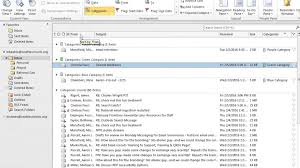According to bizcommunity.com, 306 billion emails are sent each day, with about seventy-five percent estimated to be spam according to the Radicati Group (2020). Getting through the seventy-five percent, plus the twenty-five percent you need for actual work, takes up valuable time. I read an article recently that stated about 30% of employees have over 1,000 emails in their inbox at any given time while another article mentioned that emails have increased 5% since the pandemic.
Now, imagine that every time you receive a new message, a bell sounds or a preview notice of incoming mail comes into view. When that happens,
it grabs your attention and starts to pull you toward multitasking. We live in a very reactive work environment now. Sending and receiving
emails has made us slaves to this form of communication, and keeps us leashed to whatever device gets us that information. Take back control
and be proactive in dealing with ancillary email impacts. Let’s start to implement concrete email strategies.
• Block off and dedicate time to manage your email. Whether you do it in the morning, before lunch, late afternoon, or all of the above, you should have dedicated time for it and not take
them on one at a time, throughout the day.
• Ignore new messages. Rather than behaving like Pavlov’s dog and responding to every bell that rings telling you that “You have mail,” become proactive and take control of when you
choose to spend time reading email.
• Deal with it one time. Remember to touch an email once. Take action on the emails such as moving it to another location or scheduling a meeting or a phone call, but don’t read it and keep
it there. This causes you to read it multiple times.
• Resist the immediate temptation to grab your smart phone. Don’t read emails immediately when you wake up. This will create an instant heavy workload and frustrated state of mind. Give yourself a chance to adjust to your day prior to checking your email.
• Turn off the feature that confirms you have a new email or provides a preview; you don’t want the distraction of knowing that an email came in. If you’re blocking off time and have set
expectations with those you work with, you don’t need these features.
• Avoid unnecessary ‘thank you’ emails. They often create an avalanche of somewhat meaningless emails that go back and forth. If it is truly worthy, call or write a heartfelt note. In
my first six months at a new job, I had over thirteen hundred emails saying some version of thank you. There were some that were heartfelt, but there were others that were less sincere and
simply read “thx.” The emails caught my attention and forced me to stop what I was doing to delete them.
• Simplify your organization. I recommend against setting up auto-filtering to organize emails by categories, senders, etc. It creates the need to look in multiple places when researching or
looking for something. You should do your organizing through file management, since you get information from many sources, not just email. Build strong online file management systems to
assist in searching for pertinent material.
Taking a proactive, methodical, and strategic approach to email management will allow you to take back your day and become a more productive professional.
Thomas B. Dowd III’s books available in softcover, eBook, and audiobook (From Fear to Success only):
- Down the Chute: A Toboggan Tale (children’s book)
- Now What? The Ultimate Graduation Gift for Professional Success
- Time Management Manifesto: Expert Strategies to Create an Effective Work/Life Balance
- Displacement Day: When My Job was Looking for a Job…A Reference Guide to Finding Work
- The Transformation of a Doubting Thomas: Growing from a Cynic to a Professional in the Corporate World
- From Fear to Success: A Practical Public-speaking Guide received the Gold Medal at the 2013 Axiom Business Book Awards in Business Reference
- The Unofficial Guide to Fatherhood
See “Products” for details on www.transformationtom.com. Book and eBook purchase options are also available on Amazon- Please click the link to be re-directed: Amazon.com

